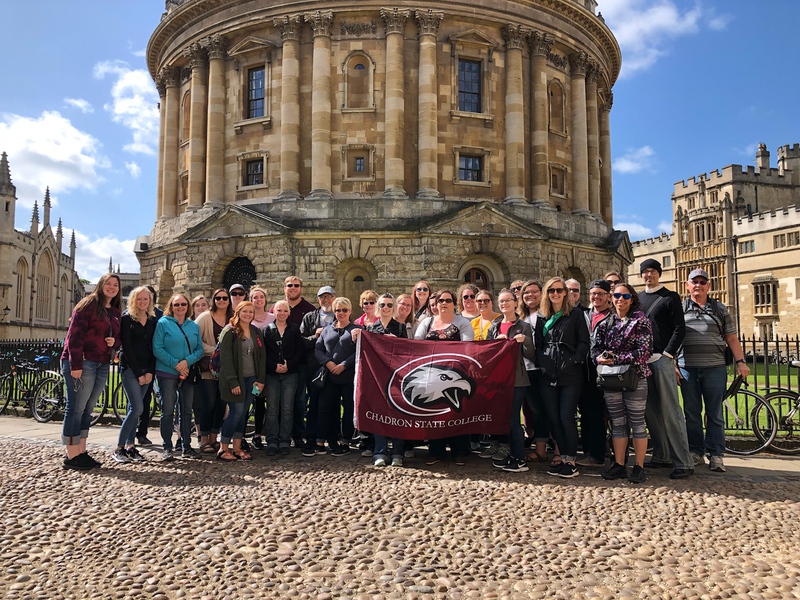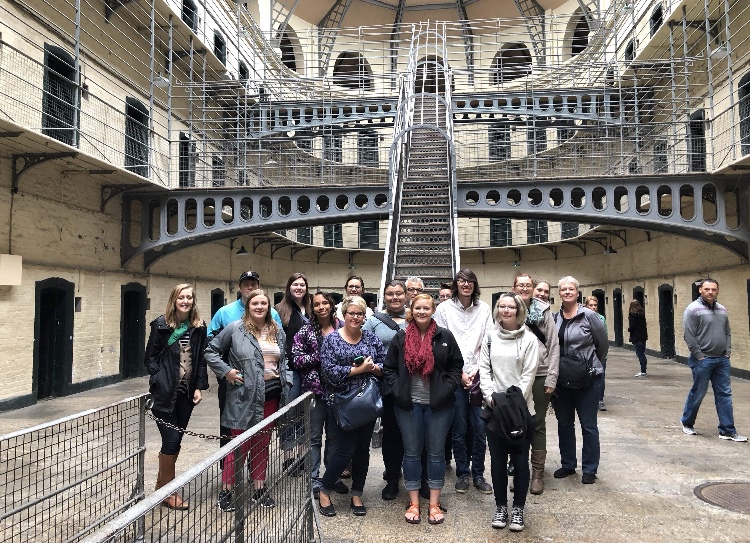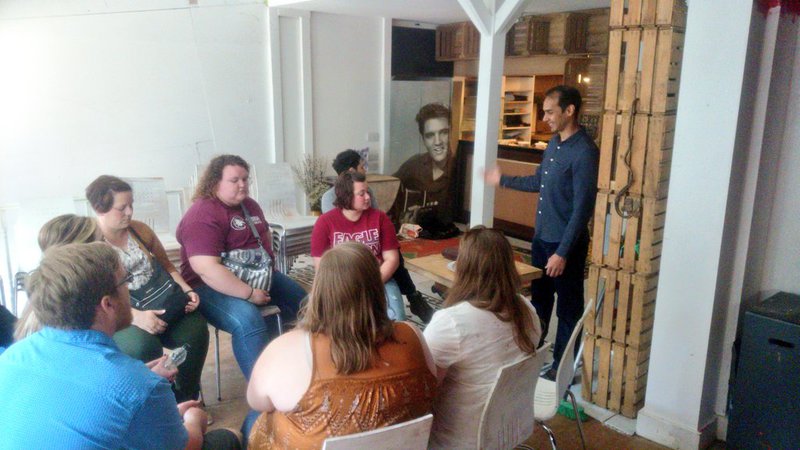Studying abroad creates unique learning experience for CSC students

CHADRON – Last May, Chadron State College students Amee Diers of Hay Springs, Nebraska, and Renae Kueter of Pierre, South Dakota, embarked on a trip that led them on a unique learning experience.
The pair joined 25 other students from CSC’s Business, Justice Studies and Education departments to venture on a two-week study abroad trip to London and Dublin in May 2018.
Both Diers and Kueter believe the trip was an exclusive experience.
“For me it was a once in a lifetime opportunity that provided unique travel, cultural and business opportunities,” said Diers, CSC’s assistant director of Human Resources, who is pursing a master of business administration. “I really feel that for graduate students it gave a practical opportunity to see the insides of different businesses, which other than an internship that’s the only time that you can get hands-on learning.”
For Kueter, a Criminal Justice major with an emphasis in Forensic Studies, the opportunity to study abroad fulfilled a curiosity triggered by having a foreign exchange student as a peer in fifth grade.
“I wanted to get a taste of what it was like to study abroad. I had gone to Europe before but wanted to travel to different countries with an educational experience,” Kueter said.
Previously primarily interested in forensic science, Kueter feels corrections is a career option that she may be more drawn to after seeing other countries’ prison systems.
“What was most interesting to me was when we got to see the prisons. The spring semester before, I was in institutional corrections, where we got to go to American prisons and jails. Having that experience gave me insights on cultural differences when we were abroad,” Kueter said.
A specific prison experience exposed Kueter to cultural variances in prison structures and techniques.
“In American prisons, it is a punishment to be in jail. At Arbor Hill in Dublin, the focus was on rehabbing. They had so many different programs, such as music and cooking programs, and they were in their own clothes and some even had X-boxes in their rooms,” Kueter said.
A definite example of the prison’s success was that an inmate came in illiterate and was working on his master’s degree when Kueter and the Criminal Justice students visited.
Diers said she gained insight from the cultural differences when touring businesses abroad.
“The type of businesses we visited when we were abroad were very different from what we would observe in rural Nebraska or that we would participate in. They also were very non-structured and collaborative. It’s interesting to me how business continues to evolve for entrepreneurs and how much more entrepreneur-friendly the world is becoming,” Diers said.
Diers noted how teamwork was essential to many of the businesses, specifically with Collaborative Café – a restaurant in which different entrepreneurial chefs shared one location to lower overhead costs.
“The Collaborative Café was really interesting to me. I just think about how many people struggle with teamwork, and the company is entirely built on teamwork and rotating and how they really have a unique niche with a different menu every day because they have new chefs coming in,” Diers said.
Working in higher education, Diers was intrigued by the incubator business school at the University of Central Dublin.
“I thought it was really neat how they are working on patents and products,” Diers said. “It is a unique way to fund your institution because students need help getting through that process of getting something to production and the university gets to recoup some of the funds for future ideas.”
Diers said all of the businesses were excited and passionate about the group studying business and answered any questions, which contrasts to a more secretive atmosphere in U.S. businesses.
During any free time, students were encouraged to explore their own excursions.
Kueter said those opportunities allowed her and her group members to see what they were capable of on their own.
“Personally, I got to see how well I could handle different situations. Knowing I could handle myself in those situations gives me confidence now to do other things,” Kueter said.
The experience helped Kueter, who extended her trip for two more weeks to visit family friends in Spain and Switzerland, and a friend in Amsterdam.
Kueter said she appreciated how supportive the trip’s faculty members, START Office and Kate Pope, Justice Studies Project Coordinator, were throughout the process.
Kueter said anyone interested in studying abroad should attend an informational meeting because, although it is a big commitment, none of it is unmanageable. In addition, she explained financial aid and scholarships are available.
Diers said the experience is one students should not fear.
“I think a lot of people think there is some barrier. While it might seem financially daunting, if you make a plan and stick to it, it is definitely possible,” Diers said. “The opportunity provides a bigger box of tools because you see how people handle things outside of the states. I would go again in a heartbeat.”
Kueter encourages students to take advantage of the experience.
“I can’t stress how much I would recommend going on this trip. For me, it was a really unique experience that I don’t know if I would have got otherwise,” Kueter said. “It's really easy to play it safe or timid in a new place, but you are over there on a once in a lifetime experience, so you might as well do everything that you can.”
Category: Campus News, Study Abroad


